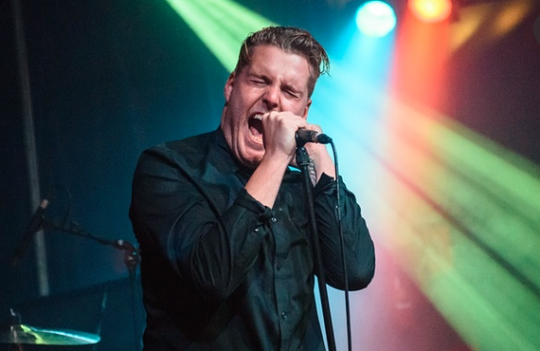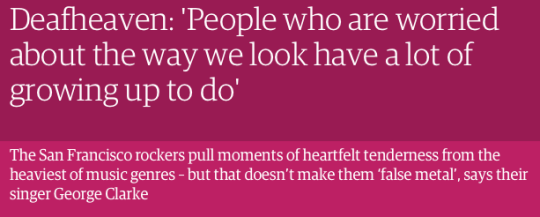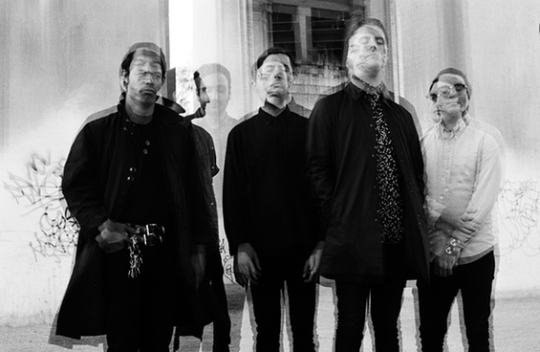


Dressed in sweat-slicked black button-down shirt and resembling some dashing fallen preacher who has misplaced his dog collar, George Clarke blows a giddy, sincere, theatrical kiss to the moshpit oozing and writhing at his feet, a gesture of stageplay worthy of Freddie Mercury himself. His band Deafheaven are, however, several fathoms heavier than Queen ever were; the blitz of their guitars sounds like dragons’ breath scorching the Earth, while Clarke’s anguished howls often suggest livestock travelling through the final stages of an abattoir, albeit in a good way.
Deafheaven’s roots lie in that most extreme of heavy metal subsects, black metal, but they eschew the genre-defining uniform of corpse-paint and their lyrics have no truck with satanism; their assault of blast beats and unsettling screams, meanwhile, is adulterated with swooning passages of poignant noise that owe more to My Bloody Valentine and Mogwai than Mercyful Fate. Such tinkering with the formula has won Deafheaven praise beyond the black metal realms – outlets as mainstream as National Public Radio in the US, Rolling Stone and Pitchfork raved about their second full-length album Sunbather, which Metacritic dubbed 2013’s “best-reviewed album” – but also earned scorn from purists.
“People who are worried about the way we look have a lot of growing up to do,” says Clarke, with a sigh. It’s the afternoon before the gig, and he’s gazing over rain-soaked London and getting philosophical about the haters. Still, he can understand the tribalism that drives some to declare his band “false metal”. Extreme music offered Clarke a community and a culture as he was growing up. “I was raised on this stuff,” he says. “I know my shit.”

His parents split up when he was young and he was brought up by his mother, who, he says, “raised me on good music – Nine Inch Nails, Radiohead”. They moved to Modesto, California, when he was 14, and he joined his new high school mid-semester. “There were, like, six punks in the whole student body,” he remembers, an experience he likens to TV’s Freaks And Geeks, “but way worse”. Still, among those six punk kids, Clarke discovered his future creative foil, Kerry McCoy. “We found each other easily: he had a jean jacket with a Dead Kennedys patch, and I was wearing a Slayer shirt. He introduced me to all the other punks and they used to smoke cigarettes in the park after school. I was immediately with the bad kids, and that’s where I fit.” Clarke had attended his first concert two years earlier – Pantera, supported by Slayer, Static-X and Morbid Angel. “Before that show, I didn’t know there was anything more extreme than Korn or Deftones. And when that door opened, I just wanted more of it, I wanted to see how far down the rabbit hole it went.” He got into thrash metal, then death metal, and finally black metal. “I would see gruesome sleeve art and think, I’m gonna buy this,” he says, laughing.
Soon he was making music of his own; much of it, by his own admission, was terrible. But Deafheaven, the second band he’d formed with McCoy, was different. They drew upon black metal, but recognised that this music, seemingly so fierce on the surface, possessed an unlikely tenderness and grace. “The chord progressions are very orchestral, there’s a lot of grandiose beauty,” Clarke says. “And what drew us initially to American black metal like Ludicra and Velvet Cacoon was the constant blastbeat [the high-speed drums that are the genre’s signature], which can be really hypnotic – you can write a 10-minute song to it, and it feels like no time has passed.” The pair alloyed this black metal roar with post-rock influences, though Clarke’s keen to add that they “weren’t the first to experiment with that by any means – we’d listened to bands like Alcest and Wolves in the Throne Room who were progressing the genre.”
McCoy composed most of the music; the lyrics were Clarke’s lookout, and again they diverged from the genre blueprint. “We discussed the lyrical approach early on,” says Clarke. “I told Kerry, ‘It’s great to have this powerful music, but I want to bring something further to it, and I want it to be autobiographical, to be extremely personal.’ I might as well give all of myself to the listener; otherwise, they might feel cheated, and I might, too. Kerry’s guitar-playing is very emotional, so it lends itself to that.”
From their 2011 debut album, Roads to Judah, onwards, Deafheaven’s lyrics have been unflinchingly honest, and sometimes harrowingly autobiographical; that album even included an instrumental to which Clarke added a recording of McCoy buying drugs from his dealer. “Roads To Judah was about, uh, free living, and being young in the city and getting into too much all the time, and it taking its toll on you – physically, mentally, everything. We moved from this small town to San Francisco, life was fast, and anything put in front of our face, we would do it. We took a lot of drugs. That’s really what the record is about – this lifestyle impacted on me in so many ways, not all positive. Some of it real negative.”
As the albums have progressed, so Clarke has probed deeper inside himself. Sunbather closed with The Pecan Tree, examining the dysfunction that drove Clarke’s bad habits, substance abuse issues passed from father to son. “I was recognising that I felt bad and wanted to do better. I feel trapped in my lifestyle. All the records have been about dissecting my often conflicted mind.” Their latest album, New Bermuda, explores themes of maturity and dissatisfaction. “You think its going to be paradise, and then you get swallowed up by real life,” says Clarke of the group’s darkest, heaviest and most beautiful record yet.
While it’s hard to decipher exactly the words Clarke is singing unless you have the lyric sheet to hand (“I like that people need to investigate it,” he says, “it makes the experience more immersive”), Deafheaven’s emotional impact is undeniable. Tonight’s encore sees Clarke wade into the pit and silently mouth the words to Dream House while pointing at his heart. If at times this music ceases to resemble metal, none of it rings false.
“It’s interesting to open doors for people,” Clarke says, of bringing black metal to new audiences that might balk at the purist stuff. “There’s a humanity to our lyrics, people can see through to the bigger picture. Deafheaven isn’t about fitting some narrow definition of what black metal should be, it’s emotional, giving music for anyone willing to open their ears to it, and that’s our only agenda.”
New Bermuda is out now on Anti-.